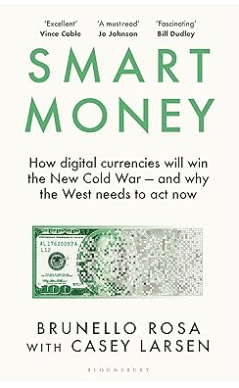
Book Bits: 21 December 2024

By purchasing books through this site, you provide support for The Capital Spectator’s free content… Press) The power to create money is foundational to the state… In Our Money, Leah Downey makes a principled case against central bank independence (CBI) by both challenging the economic theory…
 ● Smart Money: How digital currencies will win the new Cold War – and why the West needs to act now
● Smart Money: How digital currencies will win the new Cold War – and why the West needs to act now
Brunello Rosa and Casey Larsen
Summary via publisher (Bloomsbury)
A New Cold War is underway. Whereas the first Cold War was dominated by the threat of nuclear conflict, the new front line is economic and financial, but still dominated by technology. Who controls its future will help decide the outcome of the geopolitical struggle between China and the US. Since the end of the Second World War, the US dollar has been the global reserve currency, which has ensured American dominance of the world economy. But no longer. More than a hundred countries are developing Central Bank Digital Currencies (CBDCs), digital equivalents to cash that will utterly transform how we do business at home and abroad.
 ● The Measure of Economies: Measuring Productivity in an Age of Technological Change
● The Measure of Economies: Measuring Productivity in an Age of Technological Change
Marshall B. Reinsdorf and Louise Sheiner (Editors)
Summary via publisher (U. of Chicago Press)
Official measures of gross domestic product (GDP) indicate that productivity growth has declined in the United States over the last two decades. This has led to calls for policy changes from pro-business tax reform to stronger antitrust measures. But are our twentieth-century economic methods actually measuring our twenty-first-century productivity? The Measure of Economies offers a synthesis of the state of knowledge in productivity measurement at a time when many question the accuracy and scope of GDP. With chapters authored by leading economic experts on topics such as the digital economy, health care, and the environment, it highlights the inadequacies of current practices and discusses cutting-edge alternatives.
 ● Buffett’s Early Investments: A new investigation into the decades when Warren Buffett earned his best returns
● Buffett’s Early Investments: A new investigation into the decades when Warren Buffett earned his best returns
Brett Gardner
Review via Business Insider
There’s a common perception that Warren Buffett struck gold as a young investor by poring over long lists of stocks and scooping up the cheapest ones. But he went to far greater lengths to understand what he was buying before he pounced, a recent book points out.
Author Brett Gardner details several examples of the Oracle of Omaha’s dogged pursuit of information in “Buffett’s Early Investments: A new investigation into the decades when Warren Buffett earned his best returns.”
The future billionaire and Berkshire Hathaway CEO skipped class to attend annual meetings or paid others to go and ask questions for him. He flew around the US to meet company executives and looked into their personal finances, habits, and motivations.
 ● Our Money: Monetary Policy as if Democracy Matters
● Our Money: Monetary Policy as if Democracy Matters
Leah Downey
Summary via publisher (Princeton U. Press)
The power to create money is foundational to the state. In the United States, that power has been largely delegated to private banks governed by an independent central bank. Putting monetary policy in the hands of a set of insulated, nonelected experts has fueled the popular rejection of expertise as well as a widespread dissatisfaction with democratically elected officials. In Our Money, Leah Downey makes a principled case against central bank independence (CBI) by both challenging the economic theory behind it and developing a democratic rationale for sustaining the power of the legislature to determine who can create money and on what terms. How states govern money creation has an impact on the capacity of the people and their elected officials to steer policy over time. In a healthy democracy, Downey argues, the balance of power over money creation matters.
Please note that the links to books above are affiliate links with Amazon.com and James Picerno (a.k.a. The Capital Spectator) earns money if you buy one of the titles listed. Also note that you will not pay extra for a book even though it generates revenue for The Capital Spectator. By purchasing books through this site, you provide support for The Capital Spectator’s free content. Thank you!
Author: James Picerno
